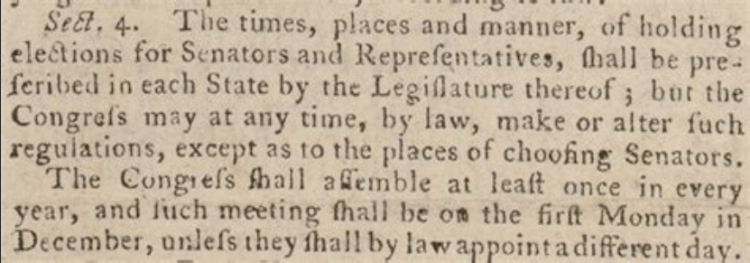
Congress Objecting to Presidential Electors Is a Civil Rights Imperative
by Jake Hoffman
The stage is being set for January 2021, more specifically January 6th, to be one of the most consequential periods in our nation’s storied history. Dozens of members of the U.S. House and at least a few members of the Senate have expressed their intent to formally object to the Electoral College tallies in nearly a half dozen states due to the pervasive election irregularities and alleged voter fraud that occurred.
As the day approaches, the left-wing media has been quick to describe this as an “assault on democracy,” among many other things. But if Democrats are going to pretend to be appalled by this “disruptive” action, they need to take a look in the mirror. By their own standards, Democrats have been assaulting democracy for quite some time.
In nearly 150 years, Electoral College votes have been objected to four separate times, three of which were in the last 20 years and all four times Electoral College votes have been objected by Democrats.
Four years ago on January 6, 2017, Democratic House members objected to Electoral College votes for Donald Trump eleven times. Ironically, the presiding President of the Senate at those proceedings was none other than Joseph Biden, then Vice President. Biden shot down those objections on procedural grounds: objections must be filed in writing and have the signature of both a House member and a seated Senator. The 2017 challenges failed to cross that hurdle.
Lest you think this was just a product of early onset Trump Derangement Syndrome, similar attempts were made in January of 2001 to contest the outcome of the “hanging chad” election. In that year, Democrats made 20 objections, and were shot down on the same procedural grounds as in 2017: failing to secure the objection in writing signed by both a House member and a Senator.
The Democrats actually mounted a challenge a third time: January 2005 regarding the outcome of the Bush-Kerry election. That year Democrats did submit an objection in writing by Rep. Stephanie Tubbs Jones (D-OH) and Sen. Barbara Boxer (D-CA). That led Vice President Dick Cheney to order the two bodies, House and Senate, to their respective chambers to debate the objection. The GOP controlled both chambers at the time and the objection went nowhere.
Senator Boxer said at the time, “While we have men and women dying to bring democracy abroad, we’ve got to make it the best it can be here at home, and that’s why I’m doing this.” Rep. Tubbs Jones said, “How can we possibly tell millions of Americans who registered to vote, who came to the polls in record numbers, particularly our young people… to simply get over it and move on?”
The law in effect to count the electoral votes was passed in 1877 and the only time these procedures had been invoked prior to 2001 was in January 1969. One of North Carolina’s 13 electors cast his vote for Independent Candidate for President George Wallace, rather than for Republican Richard Nixon. Rep James O’Hara (D-MI) and Sen. Edmund Muskie (D-ME) filed an objection to North Carolina’s tally. They wanted to discourage so-called “faithless electors” in the future. Ultimately, the House voted against the objection 228-170 and the Senate 58-33.
Protecting the integrity of American elections isn’t merely good public policy, it is a civil rights imperative. As engaged citizens, we must do all in our power to encourage and pray for the courageous men and women who will stand up and object. Whatever happens, do not let the media and Democrats get away with slandering these actions. After all, it was Democrats who pioneered this strategy.